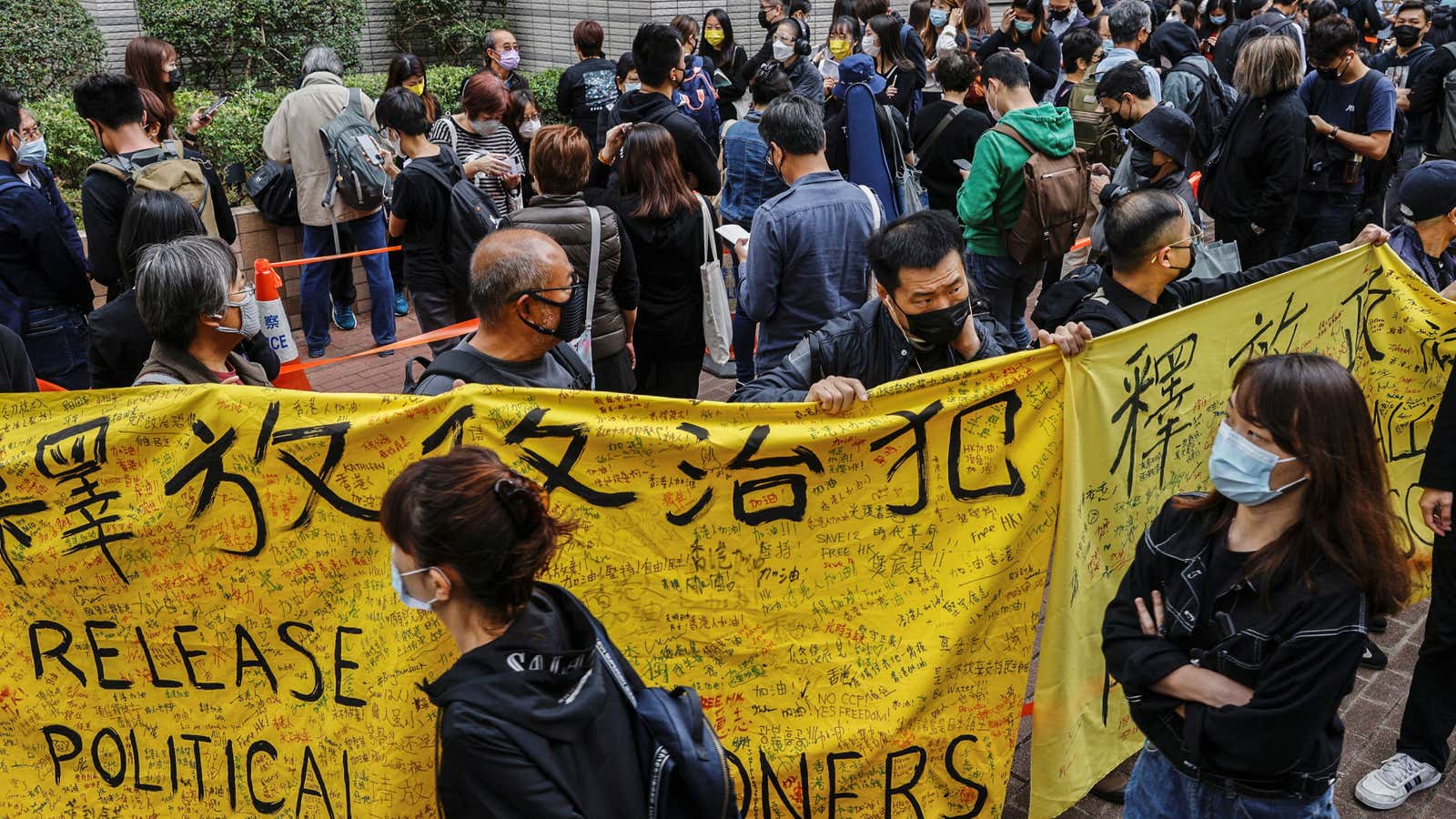The alleged crime: democracy. The punishment: up to life imprisonment.
Nearly 50 prominent Hong Kong democracy activists who were formally charged on Sunday with subversion under the national security law appeared in court today for their arraignment, as hundreds of supporters gathered outside demanding the release of “all political prisoners”—the largest protest the city has seen in months.
At the heart of the case against the activists are allegations that would be deemed absurd in any functioning democracy. But in the current repressive era of Hong Kong under Beijing’s crackdown, the charges are part of a comprehensive state-led campaign to criminalize and extinguish essentially all forms of political dissent.
The defendants include a nursing student in his early 20s, a former journalist turned politician, a nurse who led a medical strike to call for stricter border controls at the start of the pandemic, and a legal scholar. What they all have in common, according to Hong Kong authorities, is their role in an apparently nefarious conspiracy to organize an informal opposition primary so as to gauge voter preferences and increase their chances of winning an opposition majority in the city’s legislature, thereby undermining the functions of government and subverting the state. If convicted, they face years, and up to life, in prison.
Reading the detailed charges against the 47 activists gives a sense of the scope of their alleged crimes. Among other things, they are accused of “inciting, procuring, inducing or causing” people to run in local legislative elections, and “inciting, procuring, inducing or causing” those candidates, if they win office, to block the government’s budget.
Of course, this supposed crime also goes by another name: exercising democratic rights and being an opposition lawmaker. In many democracies, obstructing legislative business—also known as filibustering—is one way in which lawmakers can prevent an unwanted motion’s passage. It may not be desirable, but it’s certainly not a crime. But what was seen by many who support the democracy movement as deft political strategizing to counterbalance an electoral system that’s already heavily rigged against any opposition, is being prosecuted as a plot to “overthrow” the government.
Since then, Beijing has pushed for reforms to plug “legal loopholes” to ensure that only “patriots” who love the Chinese Communist Party can run for office in an election whose date is yet to be determined after last year’s legislative vote was indefinitely postponed.
The defendants had previously been arrested in January in a mass round-up, but were all released on bail pending further charges. Of the 55 who had been arrested, 47 have now been formally charged. The remaining eight, including an American lawyer, could still face charges.
Hanging over the legal proceedings is the question of whether the activists will get a fair trial in a court system that is under immense political pressure. Last month, Xia Baolong, China’s director of Hong Kong and Macau affairs, called for legal scholar Benny Tai and activist Joshua Wong—both defendants in this case—to be “severely punished under the law.” And there’s also the more immediate question of whether the 47 activists will be granted bail; a separate court judgment last month appeared to set a precedent that the denial of bail should be the default under the national security law unless the defendant can prove they will not continue committing their alleged offenses.
Read the allegations made by the national security department of the Hong Kong police against the defendants, reproduced in part below:
(i) advocating, engaging or participating in a scheme with a view to abusing his or her powers and functions entrusted under Article 73 of the Basic Law…after being elected to be a member (“Member”) of the Legislative Council (“LegCo”) for the purposes of: –
(a) obtaining a controlling majority in the LegCo to indiscriminately refuse to pass any budgets or public expenditure to be introduced by HKSAR Government (“the Government”) regardless of their contents or the merits of their contents;
(b) compelling the Chief Executive of the HKSAR (“the Chief executive”) to dissolve the LegCo under Article 50 of the Basic Law so as to paralyse the operations of the Government;
(c) ultimately causing the Chief Executive to resign under Article 52 of the Basic Law entailed by the dissolution of the LegCo and the refusal to pass the original budget by the new LegCo;
(ii) with a view to carrying out the Scheme, to stand or not to stand as candidates in the LegCo election (“the Election”), and/or inciting, procuring, inducing or causing others to stand or not to stand as candidates in the Election;
(iii) undertaking or agreeing, and/or inciting, procuring, inducing or causing others to undertake or agree, to exercise or forbear to exercise his or her powers and functions under Article 73 of the Basic Law after being elected as a LegCo Member when examining and approving budgets for public expenditure to be introduced by the Government in accordance with the Scheme;
(iv) undertaking or agreeing, and/or inciting, procuring, inducing or causing others to undertake or agree, to wilfully or intentionally fail or neglect to discharge his or her duties of a LegCo Member after being elected in the Election, that is, to uphold the Basic Law, bear allegiance to HKSAR of the People’s Republic of China and serve HKSAR conscientiously, dutifully, in full accordance with the law, honestly and with integrity;
seriously interfering in, disrupting or undermining the performance of duties and functions in accordance with the law by the body of power of HKSAR.
